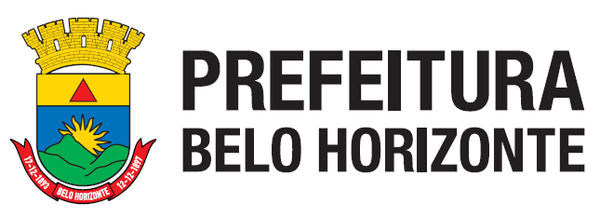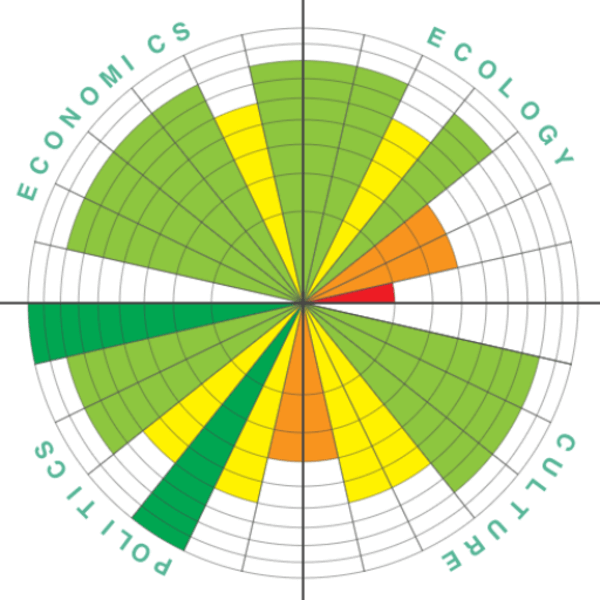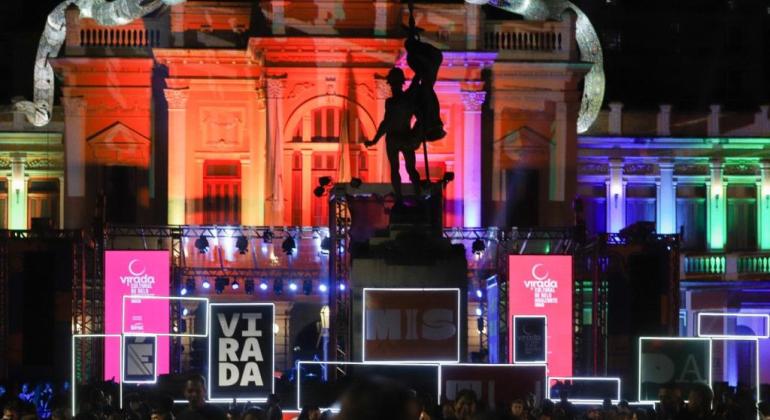 Virada Cultural stands out as one of the most vibrant festivals in the city - © Flávio Tavares/Prefeitura de Belo Horizonte
Virada Cultural stands out as one of the most vibrant festivals in the city - © Flávio Tavares/Prefeitura de Belo Horizonte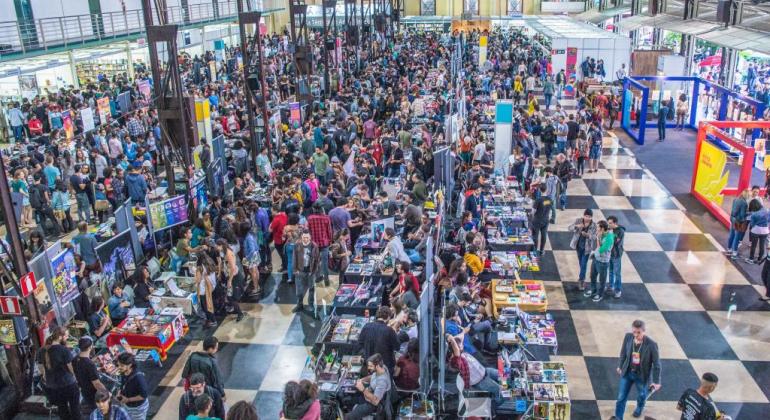 International Comic Festival - © Ricardo Laf/Prefeitura de Belo Horizonte
International Comic Festival - © Ricardo Laf/Prefeitura de Belo Horizonte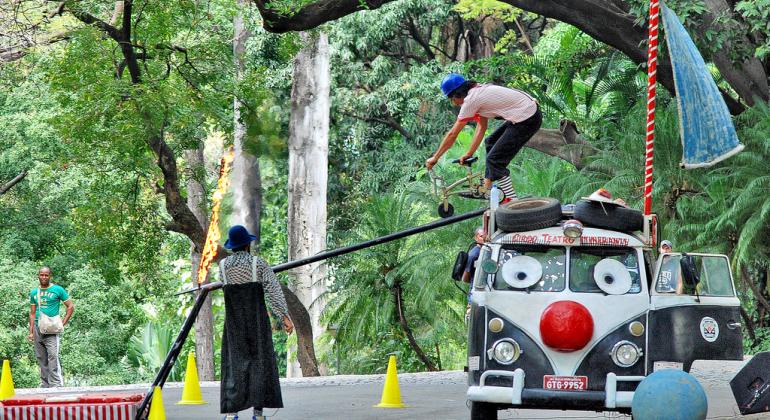 International Stage & Street Theater Festival - © Breno Pataro/Prefeitura de Belo Horizonte
International Stage & Street Theater Festival - © Breno Pataro/Prefeitura de Belo Horizonte
City
Belo Horizonte
Main actors
City Government
Project area
Whole City/Administrative Region
Duration
Ongoing since 2017
The cultural festivals in Belo Horizonte play a vital role in promoting art, culture, and diversity in the city. These festivals are organized by the city's administration, often in partnership with the civil society, and aim to decentralize cultural activities, making them accessible to residents across different regions. Events like the Festival Internacional de Teatro (International Theater Festival) and Festival Internacional de Quadrinhos (International Comics Festival) bring together artists and audiences from around the world, fostering cultural exchange and dialogue. The festivals also contribute to the economic and social development of the city by boosting tourism, supporting local artists and entrepreneurs, and creating opportunities for cultural education and engagement. Through a combination of artistic performances, exhibitions, workshops, and discussions, these festivals enrich the cultural landscape of Belo Horizonte, making it a vibrant and inclusive city for residents and visitors alike.
One of the key objectives of these festivals is to decentralize cultural activities, ensuring that residents from all parts of the city have access to high-quality cultural events. By hosting festivals in different neighborhoods and public spaces, the city aims to democratize access to culture and create a sense of cultural belonging among its residents. Additionally, these festivals play a crucial role in promoting local artists and cultural producers, providing them with opportunities to showcase their work and gain recognition. This not only helps to support the local cultural economy but also contributes to the cultural identity of the city.
Moreover, the festivals aim to foster cultural exchange and dialogue by inviting artists and performers from different parts of Brazil and the world to participate. This exchange of ideas and artistic practices not only enriches the local cultural scene but also helps to promote understanding and appreciation of different cultures. Overall, the cultural festivals in Belo Horizonte are an integral part of the city's cultural policy, contributing to its reputation as a vibrant and culturally rich city. Through these festivals, the city seeks to promote cultural diversity, support local artists, and engage residents in meaningful cultural experiences.
Belo Horizonte currently holds 8 festivals in its Festival Policy:
-
International Stage & Street Theater Festival – FIT: consolidated as one of the largest international theater festivals in the country and one of the five main ones in Latin America;
-
International Comic Festival – FIQ: a fundamental part in the process of appreciation and growth of comics in Brazil, it presents a panel on contemporary comics production in the world and provides exchanges between national and international artists and publishers;
-
Black Arts Festival – FAN: dedicated to the appreciation and dissemination of African art. Its references articulate the ancestral roots of this culture with its contemporary expressions and are dedicated to strengthening traditional African matrices, and those resulting from contact with other cultures;
-
International Literary Festival – FLI: in addition to being the culmination of actions aimed at access to books and the promotion of reading in the capital of Minas Gerais, the festival is entirely dedicated to literature offering reading workshops, literary writing and illustration, film shows, narrations of stories, reading circles, lectures, book fair and various activities focused on the literary universe;
-
Virada Cultural: twenty-four uninterrupted hours of artistic and cultural programming in different areas: music, theater, dance, circus, literature, visual arts, performing arts, visual arts, performance, fashion, gastronomy;
-
Descontorno Cultural: the festival seeks to promote and give visibility to the work of cultural agents and artists who work on the outskirts of the city and are a reference in their territories, in addition to celebrating the actions carried out throughout the year in the Municipal Public Cultural Centers of Belo Horizonte;
-
Municipal Culture Circuit: the festival seeks to enhance Belo Horizonte's cultural and artistic programming, through the valorization of local production and relevant attractions from the Brazilian cultural scene, in a decentralized way, to serve all regions of the city;
-
Pampulha Territory Museums: the festival seeks to promote each of the main Pampulha museums, valuing their relationship with the city.
The implementation of cultural festivals in Belo Horizonte is a collaborative effort involving the city's government, cultural institutions, artists, and community organizations. The process begins with the planning and organization of each festival, which typically involves a multidisciplinary team responsible for coordinating various aspects such as programming, logistics, marketing, and funding. One of the key aspects of implementation is the selection of venues for the festival. Belo Horizonte's festivals are known for their use of diverse spaces, including parks, public squares, cultural centers, and even the streets. This approach not only provides accessibility to different audiences but also helps to revitalize and activate public spaces within the city.
Programming is another crucial element of implementation. The festivals feature a wide range of cultural activities, including music, theater, dance, visual arts, literature, and film. The programming is curated to showcase both local talent and international artists, creating a dynamic and diverse cultural experience for attendees. Additionally, the festivals often include educational workshops, panel discussions, and other activities to engage the community and promote cultural exchange. Marketing and promotion are essential components of implementation to ensure the festivals reach a wide audience. This involves the use of traditional and digital marketing strategies, including social media, press releases, posters, and advertisements. Collaborations with local media outlets and cultural influencers are also common to enhance visibility and attract attendees.
Funding is a critical aspect of implementing cultural festivals. While some festivals receive financial support from government agencies, others rely on sponsorships, grants, and ticket sales to cover costs. The city's cultural institutions and community organizations often play a significant role in securing funding and resources for the festivals. Volunteers and community engagement are integral to the successful implementation of cultural festivals. Volunteers assist with various tasks such as event setup, guest services, and artist support. Community engagement activities, such as pre-festival events, workshops, and outreach programs, help to build excitement and participation among local residents.
The funding for the Festival Policy is provided for in the budget of the Municipal Secretariat of Culture, which allocates the resources for the Municipal Foundation of Culture to carry out the different events’ implementation. Culture budget in Brazil is a constitutional obligation of the public administration.
The festivals held in Belo Horizonte have yielded significant results for the city. One notable outcome is the enhancement of the city's cultural reputation both nationally and internationally. Through events like the International Theater Festival and the International Comics Festival, Belo Horizonte has positioned itself as a cultural hub, attracting artists, performers, and visitors from around the world.
Furthermore, the festivals have played a pivotal role in community engagement and social cohesion. By offering inclusive and accessible programming, they have brought together residents from diverse backgrounds, fostering a sense of belonging and pride in local culture. The festivals also serve as platforms for dialogue and exchange, promoting cross-cultural understanding and appreciation.
On an educational level, the festivals have provided valuable learning opportunities for aspiring artists and cultural enthusiasts. Workshops, masterclasses, and panel discussions offered during festival periods have enriched the cultural landscape of the city and contributed to the professional development of individuals within the creative industries.
Overall, the realization of festivals in Belo Horizonte has had multifaceted impacts, from enhancing the city's cultural prestige and stimulating economic growth to fostering community cohesion and providing educational opportunities. These outcomes underscore the importance of investing in cultural initiatives as drivers of sustainable development and societal well-being.
Most of the challenges faced by Belo Horizonte’s administration lie with the necessary efforts to organize and promote the festivals. The city must actively engage with diverse communities to ensure the inclusivity and accessibility of festival programming. This involves reaching out to marginalized populations and implementing strategies to address barriers to participation, for example.
Moreover, the city’s administration plays a pivotal role in advocating for the cultural value of festivals and garnering public support for these initiatives. This requires effective communication strategies to convey the benefits of festivals in promoting artistic expression, fostering community cohesion, and driving economic growth.
Belo Horizonte's experience in implementing its festival policy offers valuable lessons that can be transferred to other cities around the world. Firstly, the recognition of festivals as pivotal in the cultural and economic development of a city is paramount. By prioritizing the artistic dimension, Belo Horizonte not only cultivates a thriving cultural scene but also fosters creativity, innovation, and community engagement. This emphasis on artistic diversity not only enriches the cultural fabric of the city but also nurtures a sense of identity and belonging among its residents, contributing to the overall well-being and vitality of the urban environment.
The decentralization of cultural events is also very important. Initiatives like the Descontorno Cultural and the Municipal Culture Circuit ensure that cultural activities reach all corners of the city, democratizing access and fostering community engagement. This decentralization promotes a sense of ownership of cultural spaces among residents, leading to sustainable cultural development.
The transferability of these lessons lies in their adaptability to diverse urban contexts. By prioritizing cultural investment, embracing diversity, decentralizing cultural activities, and fostering international collaboration, cities worldwide can harness the transformative power of festivals to drive cultural, social, and economic development. These principles serve as a blueprint for cities seeking to cultivate vibrant and inclusive cultural ecosystems.
On Map
The Map will be displayed after accepting cookie policy
